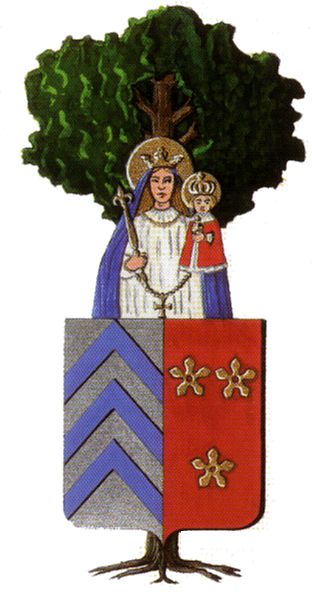Scherpenheuvel-Zichem: Difference between revisions
Knorrepoes (talk | contribs) m (Text replace - "'''Origin/meaning :'''<br/> The" to "====Origin/meaning==== The") |
Knorrepoes (talk | contribs) m (Text replace - "[[Literature" to "{{media}} [[Literature") |
||
| Line 18: | Line 18: | ||
The chevrons are derived from the old arms of Scherpenheuvel. The three roses are taken from the arms of Messelbroek. | The chevrons are derived from the old arms of Scherpenheuvel. The three roses are taken from the arms of Messelbroek. | ||
{{media}} | |||
[[Literature]] : Legend provided by Riet Frederickx, Belgium. | [[Literature]] : Legend provided by Riet Frederickx, Belgium. | ||
Revision as of 05:46, 9 July 2014
| Heraldry of the World Civic heraldry of Belgium - Belgische Overheidswapens / Armorial de Belgique |
SCHERPENHEUVEL-ZICHEM
Province : Vlaams-Brabant
Additions : 1976 Averbode, Messelbroek, Scherpenheuvel, Testelt, Zichem
Origin/meaning
The arms were officially granted on December 13, 1988.
The tree on the arms symbolises the tree of the legend that is told about the existence of Scherpenheuvel. The legend tells that there was a small statue of the Virgin Mary hanging on that tree. A shepherd came and wanted to take it away but as soon as he did this, he could not move anymore. When another person came and placed it again on the tree, the shepherd could move again. This was seen as a miracle and Scherpenheuvel in Belgium became a place of pilgrimage. Duke Albrecht and Duchess Isabella financed the building of a huge baroque basilica in the centre of Scherpenheuvel. Each year in May the season for pilgrimage is opened with a feast and each year in November the season is closed with procession called the "Kaarskensprocessie".
The chevrons are derived from the old arms of Scherpenheuvel. The three roses are taken from the arms of Messelbroek.
Contact and Support
Partners:
Your logo here ?
Contact us
© since 1995, Heraldry of the World, Ralf Hartemink 
Index of the site
Literature : Legend provided by Riet Frederickx, Belgium.











